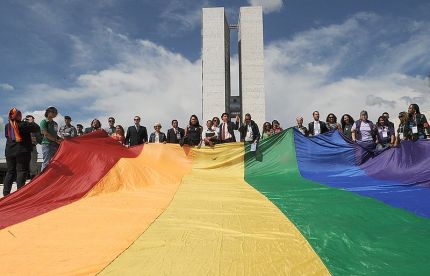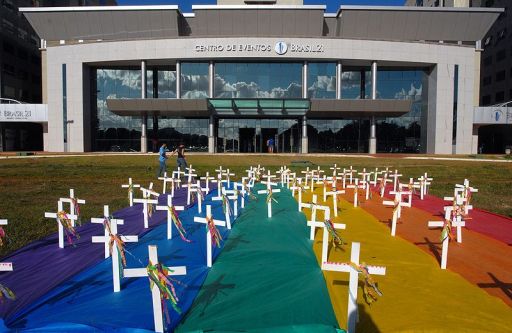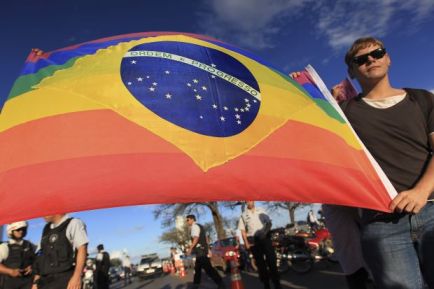Feature image via Associated Press
Brazil has had an interesting past few months. Public dissatisfaction with governmental corruption, high taxes, bad infrastructure, and Rio de Janeiro’s decision to host the 2014 World Cup and the 2016 Olympic Games (both of which which will incur massive costs) has led to the biggest protests the country has seen in decades. Just this past Thursday, tens of thousands of teachers, civil servants, hospital employees, and other unionized workers participated in a nationwide strike for better working conditions and public services, marching for hours and blocking eighty highways and the country’s biggest port. There have been enormous riots, police violence, and a level of participation across demographics that suggests things won’t calm down anytime soon. In the midst of this unrest, one of these groups — LGBT people and their allies — is hoping to have their voices heard.

LGBT PROTESTERS OUTSIDE THE NATIONAL CONGRESS (VIA AGENCIA BRASIL)
This is a timely decision for reasons beyond bandwagon-jumping. Back in March, an Evangelical Christian pastor named Marco Feliciano was elected president of the Brazilian House of Representatives’ Human Rights Committee despite a history of racist and homophobic statements — among other things, Feliciano has described AIDS as a “gay cancer” and called African people “cursed.” Feliciano was appointed by commission, not by public vote, and a poll in Folha de Sao Paulo, the country’s largest newspaper, showed that 84% of Brazilians surveyed want him to step down (some of these 84% took to the streets to underline their point). In late June, Feliciano’s committee passed a bill that “allows psychologists to treat homosexuality as a disorder or pathology,” overturning a 1999 decision by the Federal Psychological Council that banned this kind of treatment. The “Gay Cure” bill was massively protested, and withdrawn after it became clear it would be vetoed, but the fact that it passed in the Human Rights Committee is frightening.
If the legislative halls seem scary, the situation on the streets is even worse. Brazil has more anti-LGBT hate crimes than almost any other country. An official statement released in late June shows that anti-LGBT violence in Brazil has increased 46.6% in the past year — there were 9,982 reported incidents of “psychological violence, physical violence, [or] discrimination,” compared to last year’s 6,809. Many of these incidents are physical attacks: 125 trans* people were murdered in Brazil last year, and a 2011 report by Grupo Gay di Bahia found that gaybashings occur, on average, once every 36 hours. “You can’t look at those numbers and deny that there’s homophobia in this country,” said the National LGBT Council’s Janaina Oliveira. In April, Gustavo Bernardes, the general coordinator of Promotion for LGBT Rights, announced the creation of a national system to “monitor aggressions” and offer “security, legal assistance and psychological help” to victims of homophobic and transphobic violence. But these groups hope to prevent the violence in the first place with a bill of their own.

MEMORIALS FOR VICTIMS OF HATE CRIMES (VIA AGENCIA BRASIL)
PLC 122/06, or the “anti-homophobia bill,” was approved in the House of Representatives in 2006 and has languished in the Brazilian Senate since then, despite initial support from Brazilian President Dilma Rousseff. The legislation would amend existing anti-discrimination laws to specifically include “sexual orientation and gender identity.” These laws, which already apply to “age, race, color, national origin, disability, religion, sex, marital status, political affiliation, pregnancy, and citizenship,” levy significant penalties to employers, educational institutions, business owners, and landlords that use discriminatory practices. The bill also includes clauses specifically protecting the right of LGBT people to “express and manifest affection in public or private places open to all people.” Similar bills have already been passed in many Brazilian states, including Sao Paulo and Rio de Janeiro.

VIA REUTERS
Whether the whole nation will follow suit remains to be seen. Despite the less-than-stellar cultural climate and the increasing presence of Evangelical Christians in the legislature, Brazil has a history of relative political progressiveness when it comes to LGBT issues. LGBT people have been able to serve openly in the military since 1969 (way before it was cool!), although some gay soldiers say the environment there is not supportive. The first ever governmentally sponsored national LGBT conference was held in Brazil in 2008, and the first National Black LGBT conference followed four years later. Changing one’s legal gender assignment has been allowed since 2009, and as of 2007 sex reassignment surgery is free under Brazil’s health care system (although only a very limited subset of people qualifies for either of these provisions, and trans* identification is still classified as a pathology). The country legalized same-sex civil unions at the national level in 2011, and this May a court detemined that civil unions must be recognized as marriages if the couple requests it. The Brazilian Supreme Court ruled unanimously to legalize gay adoption in 2010, and also recently guaranteed gay couples’ legal access to assisted fertilization.
Still, the growing power of the Evangelical lobby puts further progress in jeopardy. Hopefully the collective power of the Brazilian people — who have, besides killing the Gay Cure bill, already passed a law dedicating oil royalties to health and education and convinced President Rousseff to meet with representatives from youth and LGBT groups — will extend to these vital issues as well.



It baffles me how a country could have so much social homophobia and yet legislatively be progressive. (I know, South Africa, but that’s a different case all together.)
One of my best friends is Brazilian, and while she’s been a huge ally in my personal life, it’s disturbed me how casually she could be homophobic and transphobic to the point where I had to talk to her about these cultural views to save our friendship. Cognitive dissonance perhaps in supporting your best friend while believing in “gay panic” excuses for transmisogynistic murders and how uncomfortable it is to see two bearded men kissing… In those discussions, however, it was always framed as “Well, in my culture, this how we see things because of the machismo attitude” rather than personal views. It’s saddening to see how deeply embedded those beliefs can be in people who otherwise are incredibly liberal.
Brazil isn’t a liberal country, we just paint ourselves as such. A lot of people in Brazil believe that there isn’t racism in Brazil because we are a multi-ethnic country, but there’s still a lot of racism and people refuse to acknowledge it.
When it comes to LGBTQ rights, it’s complicated, because there’s a part of the population that’s all for equal rights and then there’s another part that’s totally against it. It’s like opposite forces that practically cancel each other. Another big problem that we have is that Evangelical churches use their followers to get votes for conservative politicians, which results in outdated law projects (like the “Gay Cure” bill). There’s even a christian political party (PSC – Partido Social Cristão, or Social Christian Party), and a lot of the evangelical people in Brazil vote only in candidates from this party.
I can’t really explain how complicated our political situation is right now.
At least we do have some politicians who are pro-LGBTQ, and we even have a out Congressman, Jean Wyllys, who has been considered to be one of the best in Congress since 2011 (or since he has been a Congressman. I just hope he and other politicians will be able to defeat these religious conservatives and make Brazil move forward in human rights.
I guess I should’ve clarified that my Brazilian friend is very liberal, except for these aspects which are jarring to being a liberal Canadian.
I hope there are big changes in store for you and your country.
Cris, you said exactly what I was thinking. Things here are so complicated, it’s almost impossible to explain how it is.
Also, in Brazil, a lot of people say they are ok with the LGBT community and all that, but they are still very homophobic in their daily lives. They think they’re not because they honestly believe that you can only be a homophobe if you are hitting gay people with a chair or running over them with your car.
I’m very glad to see this post here on autostraddle. It’s good to know that other people over the world are hearing us.
Ah, e meu deus, outra pessoa do Brasil aqui! Será que é uma alucinação?
Oi, eu nao sou brasileira (eu sou de nova zelandia) , mas eu adoro brasil e eu posso vai volta em marco 2014! Eu sou aqui tambem!
“In The Midst of Protests, Will Brazil Finally Outlaw LGBT Discrimination?”
Well… the answer to this question is no, unfortunatelly.
It’s hard to explain how things work in Brazil, when it comes to homossexuality and its acceptance. Side by side with legislative progress, legal progress, the society itself suffers from a very acute case of hypocrisy. Here’s my personal view.
The influence of the Catholic Church in our history is undeniable. Even the most atheist person will eventually drop a “thank god” (“graças a deus”) in a casual conversation, and there are “god” references basically anywhere.
But like any other trend, the Catholic Church lost many followers. Their rituals have become boring in the eyes of the new brazilian society, and everyone got sick of putting up with the Christian guilt: why blame yourself when you put the blame on someone else?
The Evangelical churches replaced this “religious vacuum”: their pastors scream very loud and sing religious songs in carnaval rhythm. The rituals take place in fancy churches, full of wealth and ostentation. If you’re already predisposed to be a religious person, you’ll definetely see the appeal. It’s like a big concert, where everyone is sucessful and “blessed by god” – so why not join it, right?
And the worst part: Evangelical churches are very fond of the idea of blaming people with “deviant behaviors”. Bye bye, Christian guilt. Hello, homophobic behavior. Let’s put the blame on the gay people!
They propagate the idea of being gay as the most damning thing that can exist. A lot of brazilian citizens, unsure of their places in society, either through lack of education/information, whether by wanting to look like a “good person”, repeat this lesson as if it were the most accurate thing in the world.
It’s all a big marketing ploy: if a well dressed, eloquent, rich pastor, positioned above the audience, says it so… it’s better to believe, just in case. Or at least pretend you believe, because it’s much easier than taking your time to deeply reflect on the subject. In the end, everyone wants to be part of a group, to go with the flow.
Basically this is the religious situation. When it comes to the “modern ones”, the ones that don’t openly join the evangelical talk, things get messy.
There are a lot of people who are gay friendly. They show their support on daily basis, they might even get into a discussion when someone drops a homophobic comment… but when the time comes to go to the streets and show their position, especially to balance this religious fever, they don’t want to. Deep inside, they don’t want to be related with gay culture. Why if people think they’re also gay? What a nightmare to the straight-young-brazilian-middle-class person. You can be gayfriendly, but to fight for the cause… oh, it’s not my cause anymore. Leave it to the gay people.
Since Brazil has been through this economic boom the last decades, capitalism itself ended up valuing the principles: for some people, it’s almost fashion to be religious; for others, it’s very beautiful to open your mouth and say you support the gay cause. Depending on how you want your Facebook profile to look, both positions are very strong, in the eyes of those who want to prove themselves. But differently from the modern “gay friendly” group, the religious team put effort on voting on the candidates that represent their cause. And bad, bad things happen.
The situation is definitely getting better, but I believe we’re going through this very complicated phase of “Republicans” x “Democrats”, adapted to the Brazilian reality.
For those who watch Game of Thrones, the Evangelical people would be the White Walkers, and us, the gay people, would be from the Night’s Watch. We’re less in number, but we’re fighting very hard. It will get even better.